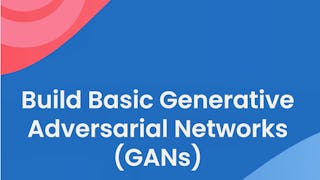Filter by
SubjectRequired
LanguageRequired
The language used throughout the course, in both instruction and assessments.
Learning ProductRequired
LevelRequired
DurationRequired
SkillsRequired
SubtitlesRequired
EducatorRequired
Explore the Generative Adversarial Networks (GANs) Course Catalog
 Status: Free Trial
Status: Free TrialDeepLearning.AI
Skills you'll gain: Generative AI, Generative Model Architectures, PyTorch (Machine Learning Library), Image Analysis, Deep Learning, Responsible AI, Artificial Neural Networks, Data Ethics, Computer Vision, Machine Learning, Image Quality, Unsupervised Learning, Information Privacy, Data Synthesis, Performance Testing
 Status: Free Trial
Status: Free TrialSkills you'll gain: Artificial Intelligence and Machine Learning (AI/ML), Exploratory Data Analysis, Generative AI, Keras (Neural Network Library), NumPy, Data Processing, PyTorch (Machine Learning Library), Predictive Modeling, Matplotlib, Data Analysis, Generative Model Architectures, Development Environment, Pandas (Python Package), Image Analysis, Deep Learning, Classification And Regression Tree (CART), Artificial Neural Networks, Artificial Intelligence, Machine Learning, Data Science
 Status: NewStatus: Free Trial
Status: NewStatus: Free TrialSkills you'll gain: Prompt Engineering, Prompt Patterns, Generative AI, Design Research, ChatGPT, Persona (User Experience), User Interface and User Experience (UI/UX) Design, Experience Design, Brainstorming, User Interface (UI) Design, Artificial Intelligence, Artificial Intelligence and Machine Learning (AI/ML), Human Centered Design, Large Language Modeling, User Story, Wireframing, Image Quality, Ideation, Responsible AI, Machine Learning
 Status: New
Status: NewPearson
Skills you'll gain: Responsible AI, LangChain, Threat Modeling, Generative AI, Application Security, Secure Coding, Large Language Modeling, Open Web Application Security Project (OWASP), Security Testing, Security Controls, Prompt Engineering, Data Security, Vulnerability Assessments, Computer Security
 Status: Free Trial
Status: Free TrialDeepLearning.AI
Skills you'll gain: Generative AI, Generative Model Architectures, PyTorch (Machine Learning Library), Deep Learning, Responsible AI, Artificial Neural Networks, Data Ethics, Computer Vision, Unsupervised Learning
 Status: Free Trial
Status: Free TrialSkills you'll gain: Generative AI, ChatGPT, Artificial Intelligence and Machine Learning (AI/ML), Responsible AI, Machine Learning
What brings you to Coursera today?
 Status: Free Trial
Status: Free TrialDeepLearning.AI
Skills you'll gain: Generative AI, Generative Model Architectures, PyTorch (Machine Learning Library), Responsible AI, Data Ethics, Deep Learning, Machine Learning, Image Quality, Image Analysis, Artificial Neural Networks, Performance Testing
 Status: Free Trial
Status: Free TrialGoogle Cloud
Skills you'll gain: Generative AI, Google Cloud Platform, Artificial Intelligence, Machine Learning Methods, Deep Learning, Natural Language Processing
 Status: NewStatus: Free Trial
Status: NewStatus: Free TrialSkills you'll gain: Generative AI, Generative Model Architectures, Deep Learning, Tensorflow, Applied Machine Learning, Artificial Neural Networks, Unsupervised Learning, Image Quality
 Status: New
Status: NewSkills you'll gain: Front-End Web Development, Google Gemini, Web Development Tools, Generative AI, Databases, Data Ethics, Responsible AI, Back-End Web Development, Web Content, Web Development, User Interface (UI), Servers, ChatGPT, Prompt Engineering, Microsoft Copilot, Test Automation
 Status: Free Trial
Status: Free TrialSkills you'll gain: Responsible AI, Generative AI, Data Ethics, Graphic Design, Adobe Creative Cloud, Prompt Engineering, Image Analysis, Artificial Intelligence, Creativity, Data Integrity, Data Security
 Status: NewStatus: Free Trial
Status: NewStatus: Free TrialSkills you'll gain: Photo Editing, Adobe Illustrator, Color Theory, Adobe Photoshop, Responsible AI, Typography, Generative AI, Graphic and Visual Design, Graphic Design, Graphic and Visual Design Software, Photography, Data Ethics, Design, Adobe Creative Cloud, Design Elements And Principles, Logo Design, Digital Design, File Management, Branding, Storytelling
Generative Adversarial Networks learners also search
In summary, here are 10 of our most popular generative adversarial networks courses
- Generative Adversarial Networks (GANs): DeepLearning.AI
- Keras Deep Learning & Generative Adversarial Networks (GAN): Packt
- Generative AI for UI UX Design: IBM
- Securing Generative AI: Pearson
- Build Basic Generative Adversarial Networks (GANs): DeepLearning.AI
- Generative AI: Introduction and Applications: IBM
- Build Better Generative Adversarial Networks (GANs): DeepLearning.AI
- Introduction to Generative AI : Google Cloud
- Introduction Course to Autoencoders, VAEs, and GANs: Simplilearn
- Generative AI for Web Developers: Pearson










